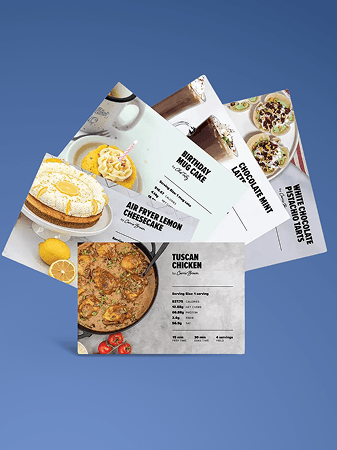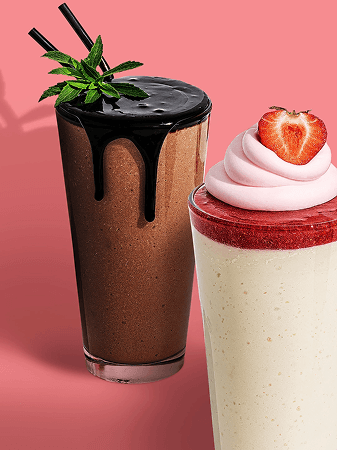Our Goal
One of the main goals of Keto Chow is to be convenient, the second is for it to give you everything you need to thrive: complete nutrition. This page has details about what nutrition is in Keto Chow, a bit about why it's in there, some information about what's NOT in Keto Chow.
Quick Facts
Net Carbs:
0.8G
Sodium - 0.9G
48% DV
Protein - 26G
52% DV
Magnesium - 0.22G
54% DV
Potassium - 1.5G
38% DV
Contains
Milk or Beef Protein from the USA (depends on flavor)
- Acacia Gum
Vitamin K2
Vitamin D3 at current optimum levels
Sodium, Potassium, Magnesium, and other electrolytes to prevent “keto flu”
Optimum Vitamin and Mineral amounts based on current science
- Choline L-Bitartrate (as opposed to DL)
- Folate as (6S)-5-METHYL TETRAHYDROFOLIC ACID (handy if you have MTHFR problems)
Doesn't Contain
Maltitol
Trans Fat
Aspartame
Soy Protein
Added sugar
- Excessive Fiber
Acesulfame Potassium (AceK)
- Heavy Metals
Our Ingredients
Why We Use Certain Ingredients and Not Others
In a previous version, Keto Chow utilized Psyllium Husk powder for fiber. I'm very happy that we switched over to Acacia Gum. It's water soluble so it has no texture and has some great benefits for ketosis and general gut health. Notably, it's fermented by gut bacteria into short chain fatty acids that make keto happy.
What you won't find in Keto Chow is the FDA recommended 28g of dietary fiber per day. I had considered adding additional acacia gum but was reminded about some fun fiber facts on the HighSteaks site:
The simple idea that we should be filling our digestive systems with something indigestible is utter madness.
Seek out the evidence for yourself – here's a hint, there's none whatsoever that fiber is something you should be consuming much of (if any), and almost certainly should NOT be supplementing.
Sure, eat some foods which happen to be rich in fiber if you like them and can tolerate them well, but it's not the fiber that makes them worth eating.
The go-to line about it all: “Fiber is great – if you live on junk food.”
Most flavors of Keto Chow use sucralose. You can read all the details about why we chose sucralose here.
However, our Natural Strawberry uses monk fruit as a sweetener instead of sucralose, and our CORE line offers unsweetened options, as well as some sweetened by stevia.
Our primary manufacturing facility has an employee that's allergic to peanuts – producing the Chocolate Peanut Butter flavor (which contains actual peanut flour, not just peanut flavor) at that facility was not an option. Instead, the Chocolate Peanut Butter flavor is mixed and packaged at a different location. The result is that all of our flavors, except chocolate peanut butter, are completely peanut free.
Depending on your taste and how long you let Keto Chow “rest” in the fridge after mixing (30 minutes minimum, overnight preferred), you may find Keto Chow rather salty at first. This isn't by accident, it's an essential feature.
When you do keto, your body will burn through electrolytes rather quickly. There are several mechanisms at work that cause this but the end result is that you need higher than normal electrolyte amounts. If you don't get enough you may experience nausea, cramping, fatigue and other flu-like symptoms. This is why the condition is commonly referred to as “Keto Flu”. The fix is easy: get some sodium, potassium, and/or magnesium. Keto Chow, by design, should allow you to completely avoid the Keto Flu, so long as your other meals (if you're eating other keto food) contain sufficient electrolytes.
Most people find that the saltiness goes away after letting it refrigerate overnight (or longer). You may also actually start to crave the saltiness as your body adjusts to ketosis and the higher electrolyte requirements.
Soy is a funny thing. There's a lot of “well I heard it from a dude at the gym that soy gives you cancer” information running around. There is very, very little scientific information based on studies to back up the concerns about phytoestrogens in soy protein causing problems in vivo with humans. Regardless: Keto Chow does not use any soy protein (which is the problem-child and what people can be allergic to) or soy ANYTHING.
Governmental Information
Here are the official United States Food and Drug Administration RDI and DRV amounts. By law, these are the amounts that must be used to calculate Daily Value percentages and recommendations on product labels. Some are an improvement over the previous numbers but I feel they are still influenced too much by lobbying groups (like the sugar industry).
You can also calculate your RDI amounts using the calculator here.
Strangely enough, Norway seems to have better-documented science behind their dietary recommendations. You can peruse the full PDF for detailed information about each nutrient. Want to know the upper tolerable limit for Iron and why that's the limit? It's all in the PDF. They do still have some rather silly stuff about saturated fats and carbohydrates but they're moving in a good direction. We'll see what the 2020 report says =)
Info about the 2012 recommendations in this PDF.
Watch our ingredients video for more information:

Supplement Facts
| Nutrient | Amount per serving (dry mix) | % Daily Value (dry mix) | Amount with fat source | % Daily Value with fat source |
|---|---|---|---|---|
| Servings Per Container | 1 | N/A | N/A | N/A |
| Serving Size | 1 Packet | N/A | N/A | N/A |
| Calories | 119 | N/A | 524 | N/A |
| Total Fat | 1g | 1% | 43g | 56% |
| Saturated Fat | <1g | 2% | 28g | 138% |
| Trans Fat | 0g | Daily Value not established | 1g | Daily Value not established |
| Cholesterol | 12mg | 4% | 146mg | 49% |
| Sodium | 834mg | 36% | 866mg | 38% |
| Total Carbohydrates | 3.83g | 7g | 3% | |
| Dietary Fiber | 2.97g | 8% | 2g | 8% |
| Total Sugars | 1g | Daily Value not established | 4g | Daily Value not established |
| Added Sugars | 0g | 0% | 0g | 0% |
| Protein | 26g | Daily Value not established | 30g | Daily Value not established |
| Vitamin D | 21mcg | 103% | 22mcg | 112% |
| Calcium | 716mg | 55% | 795mg | 61% |
| Iron | 3.1mg | 17% | 3.2mg | 18% |
| Potassium | 1541mg | 33% | 1654mg | 35% |
| Vitamin/Mineral | Amount per serving |
|---|---|
| Vitamin A | 565mcg/1027IU |
| B1 Thiamine | .51mg |
| B12 Cobalamin | 2.05mcg |
| B2 Riboflavin | .58mg |
| B3 Niacin | 6.85mg |
| B5 Pantothenic Acid | 10.12mg |
| B6 Pyridoxine | .68mg |
| Vitamin C | 123.21mg |
| Vitamin E | 8.3mg/12.3IU |
| Vitamin K2 | 41.09mcg |
| Biotin | 102.65mcg |
| Chloride | 1456.4mg |
| Choline | 205.02mg |
| Chromium | 73.91mcg |
| Copper | .69mg |
| Folate | 138.72mcg |
| Iodine | 153.97mcg |
| Lutein | 87.93mcg |
| Lycopene | 125.91mcg |
| Magnesium | 126mg |
| Manganese | .86mg |
| Molybdenum | 25.66mcg |
| Phosphorus | 390.32mg |
| Selenium | 71.86mcg |
| Vanadium | 0mcg |
| Zeaxanthin | 8.18mcg |
| Zinc | 12mg |
| Amino Acid | Amount per serving |
|---|---|
| Alanine | .81g |
| Arginine | .93g |
| Aspartic Acid | 1.83g |
| Cysteine | .27g |
| Glutamic Acid | 5.19g |
| Glycine | .45g |
| Histidine | .66g |
| Hydroxyproline | 0g |
| Isoleucine | 1.29g |
| Leucine | 2.31g |
| Lysine | 2.04g |
| Methionine | .72g |
| Phenylalanine | 1.2g |
| Proline | 2.43g |
| Serine | 1.35g |
| Threonine | 1.05g |
| Tryptophan | .36g |
| Tyrosine | 1.32g |
| Valine | 1.56g |
Ingredients
Ingredients: Milk Protein Isolate, Potassium Citrate, Salt, Natural and Artificial Flavors, Acacia Gum, Xanthan Gum, Magnesium Malate, Choline L-Bitartrate, Potassium Chloride, Vitamin Blend (Ascorbic Acid [C], Vitamin A Palmitate, Cholecalciferol [D3], Vitamin E Acetate, Niacinamide [B3], Zinc Gluconate, D-Calcium Pantothenate [B5], Ferrous Gluconate [Iron], Manganese Amino Acid Chelate, Copper Gluconate, Pyridoxal 5-Phosphate [B6], Riboflavin [B2], Thiamine [B1], Potassium Iodide, 5-Methyltetrahydrofolate [Folate], Lutein, Lycopene, D-Biotin, Chromium Picolinate, Selenium Amino Acid Chelate, Menaquinone-7 [K2], Molybdenum Amino Acid Chelate, Methylcobalamin [B12]), Cinnamon, Sucralose, Allspice, Nutmeg, Cardamom, MCT Oil, Sunflower Lecithin
Allergen Statement
Contains: Milk Protein, Cinnamon, Allspice, Nutmeg, Cardamom
Percent Daily Values are based on a 2,000 calorie diet.
Daily Value not established where marked with dagger symbol.
FAQ
That would depend on how you define a carnivore diet. Many of our customers choose to eat primarily carnivore meals, but do include Keto Chow. If our shakes do not fit into your carnivore lifestyle, we do have Egg White Protein available, which would be classified as carnivore.
The short answer is it's up to you! Everyone has different preferences, but you can find some good starting points for popular keto sweeteners here .



